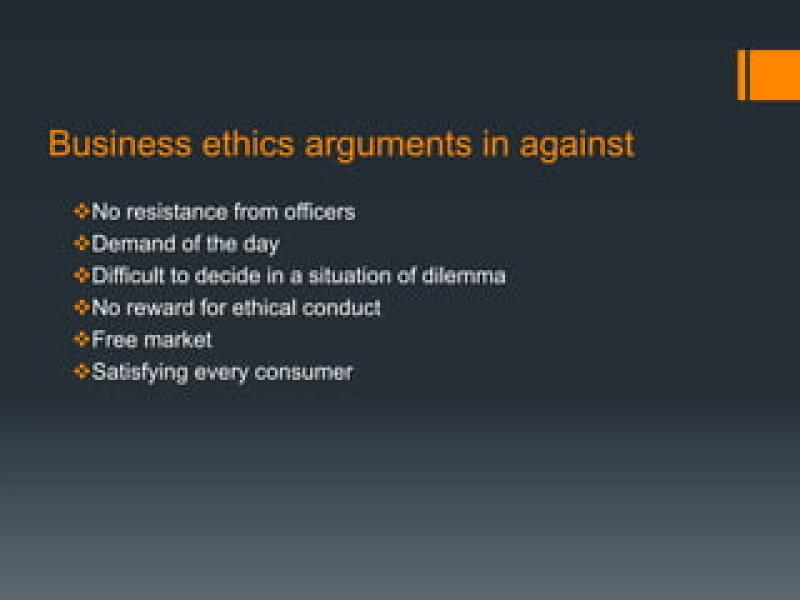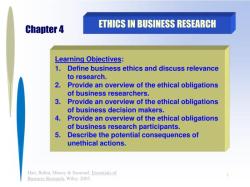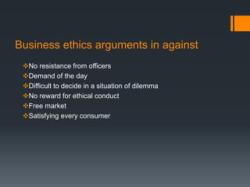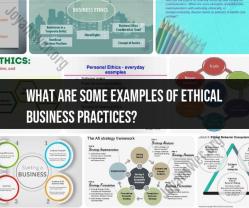What are the arguments against business ethics?
While business ethics is generally regarded as essential for responsible and sustainable business practices, some arguments against business ethics exist. It's important to note that these arguments are not universally accepted, and many experts advocate for strong ethical standards in business. Here are some common arguments against business ethics:
Profit Maximization as the Primary Goal:
- Critics argue that the primary goal of business is to maximize profits for shareholders. They contend that ethical considerations might conflict with this goal, leading to inefficiencies and reduced competitiveness.
Competitive Disadvantage:
- Some argue that businesses adhering strictly to ethical standards may face a competitive disadvantage compared to those that prioritize profits without strict ethical considerations. This could include higher production costs or limitations on certain business practices.
Cultural Relativism:
- The concept of cultural relativism suggests that ethical standards vary across cultures, and imposing a universal set of ethics may be ethnocentric. Critics argue that what is considered ethical in one culture may not align with the ethical standards of another.
Legal Compliance is Sufficient:
- Critics argue that as long as businesses comply with existing laws and regulations, additional ethical considerations are unnecessary. They believe that the legal framework is sufficient to ensure responsible business conduct.
Subjectivity of Ethical Standards:
- Some argue that ethics is a subjective and personal matter, making it challenging to establish a universally agreed-upon set of ethical standards for businesses. Different stakeholders may have conflicting views on what is considered ethical.
Economic Efficiency Over Social Responsibility:
- The view that businesses should focus on economic efficiency rather than social responsibility is another argument. Critics may contend that businesses are not equipped to address societal issues and should instead contribute to economic growth.
Shareholder Value vs. Stakeholder Interests:
- The debate between shareholder value maximization and considering the interests of all stakeholders is ongoing. Critics may argue that prioritizing shareholders over other stakeholders is essential for a business's survival and growth.
Potential for Greenwashing:
- Skepticism exists regarding the authenticity of some businesses' commitment to ethical and sustainable practices. Critics argue that some companies engage in greenwashing—making false or exaggerated claims about their environmental efforts to attract environmentally conscious consumers.
Pressure on Small Businesses:
- Some argue that the focus on business ethics may disproportionately burden small businesses with limited resources. Meeting stringent ethical standards might be more challenging for smaller enterprises, impacting their competitiveness.
Free Market Forces:
- Advocates of a free-market economy may argue that businesses should be subject to market forces and competition, allowing consumers to make choices based on their own values. Government intervention in the form of ethical regulations might be seen as unnecessary.
While these arguments exist, it's important to recognize that many organizations and experts emphasize the importance of integrating ethical considerations into business practices. Ethical behavior is often seen as a way to build trust, enhance reputation, and contribute to long-term sustainability. The debate surrounding business ethics continues, with ongoing discussions about finding a balance between profit motives and responsible corporate behavior.
The debate around business ethics remains hotly contested, with strong arguments both for and against its adoption in the corporate world. Let's dive into the critiques and complexities involved:
1. Arguments Against Business Ethics:
- Profit Maximization: The traditional shareholder primacy model argues that a company's primary obligation is to maximize profits for its owners, and focusing on ethics can distract from this goal.
- Cost and Inefficiency: Implementing and enforcing ethical practices can incur additional costs in terms of training, compliance measures, and potentially sacrificing profit-maximizing opportunities.
- Subjectivity and Cultural Differences: Defining and enforcing ethical standards can be subjective and vary across cultures, creating challenges in implementation and potential inconsistencies.
- Competitive Disadvantage: Some argue that focusing too heavily on ethical conduct can put a company at a disadvantage against competitors who prioritize pure profit maximization.
2. Challenges to Relevance and Effectiveness:
- Greenwashing and Public Relations: Critics argue that some companies adopt ethical marketing strategies without substantial changes in actual practices, creating a veneer of ethical commitment for public image.
- Lack of Enforcement: Ethical codes and policies can be ineffective without strong enforcement mechanisms and accountability measures to address violations.
- Short-Term Focus: Businesses often prioritize immediate profits over long-term ethical considerations, leading to decisions that benefit the present but potentially harm stakeholders or the environment in the long run.
- Limited Scope: Critics argue that current business ethics frameworks often neglect broader societal and environmental issues, focusing primarily on internal conduct and compliance.
3. Ethical Dilemmas and Conflicting Viewpoints:
- Balancing Stakeholder Interests: Balancing the needs of shareholders, employees, customers, communities, and the environment can lead to complex ethical dilemmas, with no easy answers.
- Global Supply Chains: Companies often operate in complex global supply chains where ethical violations can occur far removed from their direct control, making responsibility and accountability difficult to establish.
- Technological Disruptions: New technologies like AI and big data raise novel ethical concerns, requiring ongoing adaptation and reevaluation of existing ethical frameworks.
- Conflicting Ethical Values: Different stakeholder groups might hold contrasting ethical values, creating challenges in finding common ground and implementing ethical practices that everyone agrees with.
4. Business Responses and Navigating Challenges:
- Increased Transparency and Reporting: Companies are increasingly adopting transparency measures like sustainability reports and stakeholder engagement initiatives to address concerns and demonstrate commitment to ethical practices.
- Investing in Corporate Social Responsibility (CSR): Many companies are integrating CSR initiatives into their core strategies, aiming to align their operations with positive social and environmental impact.
- Embracing Collaboration and Dialogue: Engaging with stakeholders, NGOs, and industry experts in open dialogue can help businesses identify blind spots, address concerns, and find innovative solutions to ethical challenges.
- Adopting Robust Compliance and Governance Systems: Implementing strong internal controls, whistleblower protection programs, and independent audits can help prevent ethical violations and hold individuals accountable.
5. Informing Ongoing Discussions and Improvement:
- Identifying Weaknesses and Gaps: Recognizing the limitations of current frameworks and acknowledging valid criticisms can fuel further development and improvement of business ethics practices.
- Encouraging Critical Thinking and Innovation: Engaging in thoughtful dialogue and considering diverse perspectives can lead to more nuanced and comprehensive approaches to ethical challenges.
- Prioritizing Transparency and Accountability: Maintaining transparency in decision-making, actions, and impact can build trust and encourage stakeholder engagement in improving ethical practices.
- Adapting to Evolving Challenges: As technology and societal expectations evolve, ethical frameworks and business practices need to adapt to address new concerns and navigate emerging ethical dilemmas.
By understanding the arguments against business ethics, acknowledging the complexities and challenges involved, and embracing open dialogue and continuous improvement, we can work towards a future where responsible and ethical conduct is not just a theoretical ideal, but a tangible reality guiding corporate decision-making and shaping a more sustainable and equitable world.




